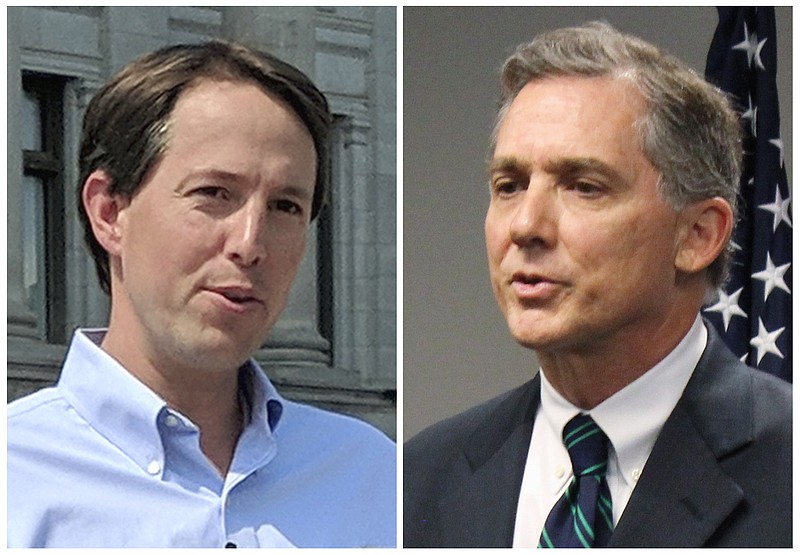CONWAY, Ark.-Attempts to scrap the federal health care law have been the focus of Democrats' efforts to flip a congressional seat in solidly red Arkansas, but the issue was sidelined Monday in the only debate between Republican Rep. French Hill and Democratic challenger Clarke Tucker.
Hill and Tucker didn't face any questions about health care and mostly avoided confronting each other directly over the issue during the debate for Arkansas' 2nd Congressional District, which includes Little Rock and seven central Arkansas counties. The debate also featured Libertarian nominee Joe Swafford.
Arkansas hasn't sent a Democrat to the U.S. House since 2010, and President Donald Trump easily won the state two years ago. But Democrats are mounting a surprisingly competitive bid to unseat the two-term congressman, with Tucker focusing on health care and his own battle with bladder cancer.
The debate aired Tuesday night on the Arkansas Educational Television Network.
HEALTH CARE
Both candidates said they were surprised they weren't asked about health care. Tucker used his closing statement to tout his support for the federal health law, and said the bill to repeal it backed by Hill and House Republicans would have removed critical protections for people with pre-existing conditions.
"Health care is the issue more than any other that compelled me to run for Congress this year," Tucker said.
After the debate, Hill accused Tucker of misrepresenting the impact the House Republicans'
bill would have had on pre-exist-ing conditions.
Under the House bill, which died in the Senate, states would have been able to get federal waivers allowing insurers to charge higher premiums to people with pre-existing illnesses who have let their coverage lapse. States could then use federal money to fund government-operated insurance programs for expensive patients called "high-risk pools."
"I hope President Trump will come back to the Congress, in the new Congress, and propose to fix the broken (health care law) that leads to affordable care and accessible care," Hill told reporters.
Hill, in his closing statement, criticized a proposal backed by Tucker to allow people to opt-in to Medicare. The incumbent congressman said it would further bankrupt the Medicare program. Tucker later told reporters that participants in the opt-in program would still pay premiums and co-pays.
KAVANAUGH
The House doesn't have a vote on Supreme Court picks, but the fight over Brett Kavanaugh's confirmation was still an issue in the race. The candidates were asked what they would say to female voters who felt their concerns weren't being heard after Saturday's confirmation of Kavanaugh, who denied allegations that he sexually assaulted Christine Blasey Ford in high school.
Hill faulted the top Democrat on the Senate Judiciary Committee for not bringing Ford's allegations to the panel earlier.
"Dr. Ford had a compelling case, but that case doesn't mean that Brett Kavanaugh didn't deserve a fair hearing as well," Hill said.
Tucker said he was concerned about the message it sent to women.
"We have to question what kind of message we're sending to women and particularly to young women-in particular if they come forward with an allegation as credible and as serious as Dr. Ford brought and to not fully investigate that allegation," Tucker said.
MINIMUM WAGE
Hill and Tucker split on a measure on Arkansas' ballot that would gradually raise the state's minimum wage from $8.50 an hour to $11 an hour by 2021. Tucker said he supports the proposal.
"I do believe if you work full time in this country you should be able to afford life's basic needs," Tucker said.
Tucker said he also supports raising the federal minimum wage from $7.25 an hour, but said it should depend on cost of living in different parts of the country.
Hill said he opposes the wage hike ballot measure, and said that it wouldn't be competitive with minimum wages in surrounding states. He also said such wage increases are better handled by the Legislature.
"I think the Legislature, if they want to adjust the minimum wage from time to time, they ought to keep that power to themselves and do that legislatively and not kick it to a ballot initiative for the voters," Hill said.

